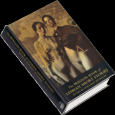

同志時尚 Gay Fashion and Gayness
 For Shakespeare, "gay" means nothing but "happy." But for our parents, "gay" is not happy, but sick. When it comes down to us, "gay" has become a fashion. On the cover of Vogue, in the Gucci's commercials or in Juliet Robert’s films, the fashion and entertainment industry are having a day with "gay" magic. We all seem to be talking about gay one way or another.
For Shakespeare, "gay" means nothing but "happy." But for our parents, "gay" is not happy, but sick. When it comes down to us, "gay" has become a fashion. On the cover of Vogue, in the Gucci's commercials or in Juliet Robert’s films, the fashion and entertainment industry are having a day with "gay" magic. We all seem to be talking about gay one way or another.
Here is an in-joke among women.
"Where can I find my Mr. Right?"
"Forget it! He’s either married or gay."
But do we really take "gay" differently than our parents? The answer is, no.
 The "gay" magic in fashion industries does not reflect what real gay (life) is like; it only reinforces the general public's misconceptions about gays. Think about it, when you see the cover boy on Vogue, what strikes you first? He is good-looking and, too bad, he's gay. What you are really thinking is: "Yeah, he is handsome but he's not man enough, he's girlish; and that's why he's on the cover of Vogue, not the cover of People."
The "gay" magic in fashion industries does not reflect what real gay (life) is like; it only reinforces the general public's misconceptions about gays. Think about it, when you see the cover boy on Vogue, what strikes you first? He is good-looking and, too bad, he's gay. What you are really thinking is: "Yeah, he is handsome but he's not man enough, he's girlish; and that's why he's on the cover of Vogue, not the cover of People."
And it is precisely because gayness has become a fashion that we think it's a quark of celebrities rather than a daily life style for common people. That explains quite well why you are scared to death when your buddy comes out of the closet but you praise Tom Cruise's alleged homosexuality. You are agitated, wondering if your pal has a crush on you. And you have no idea that you are turning out just the same as your parents--homophobic.
 For Shakespeare, "gay" means nothing but "happy." But for our parents, "gay" is not happy, but sick. When it comes down to us, "gay" has become a fashion. On the cover of Vogue, in the Gucci's commercials or in Juliet Robert’s films, the fashion and entertainment industry are having a day with "gay" magic. We all seem to be talking about gay one way or another.
For Shakespeare, "gay" means nothing but "happy." But for our parents, "gay" is not happy, but sick. When it comes down to us, "gay" has become a fashion. On the cover of Vogue, in the Gucci's commercials or in Juliet Robert’s films, the fashion and entertainment industry are having a day with "gay" magic. We all seem to be talking about gay one way or another.Here is an in-joke among women.
"Where can I find my Mr. Right?"
"Forget it! He’s either married or gay."
But do we really take "gay" differently than our parents? The answer is, no.
 The "gay" magic in fashion industries does not reflect what real gay (life) is like; it only reinforces the general public's misconceptions about gays. Think about it, when you see the cover boy on Vogue, what strikes you first? He is good-looking and, too bad, he's gay. What you are really thinking is: "Yeah, he is handsome but he's not man enough, he's girlish; and that's why he's on the cover of Vogue, not the cover of People."
The "gay" magic in fashion industries does not reflect what real gay (life) is like; it only reinforces the general public's misconceptions about gays. Think about it, when you see the cover boy on Vogue, what strikes you first? He is good-looking and, too bad, he's gay. What you are really thinking is: "Yeah, he is handsome but he's not man enough, he's girlish; and that's why he's on the cover of Vogue, not the cover of People."And it is precisely because gayness has become a fashion that we think it's a quark of celebrities rather than a daily life style for common people. That explains quite well why you are scared to death when your buddy comes out of the closet but you praise Tom Cruise's alleged homosexuality. You are agitated, wondering if your pal has a crush on you. And you have no idea that you are turning out just the same as your parents--homophobic.
